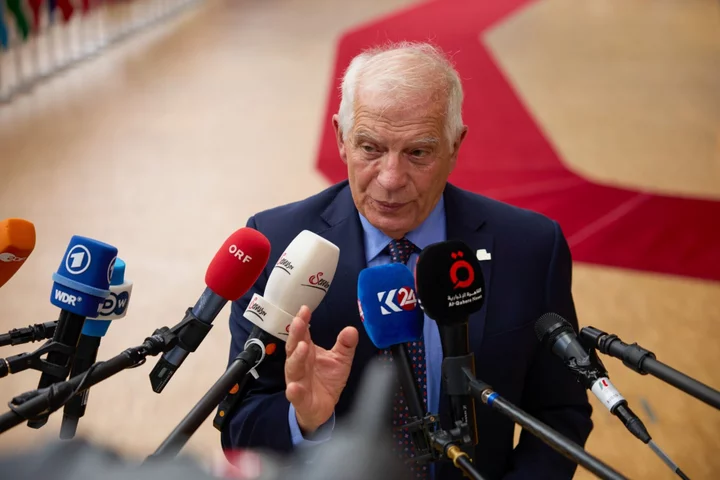
Europe’s Top Diplomat to Visit Beijing as Economic Rivalry Grows
The European Union’s top diplomat will head to Beijing next week for meetings with Chinese officials, a trip
2023-07-04 11:28
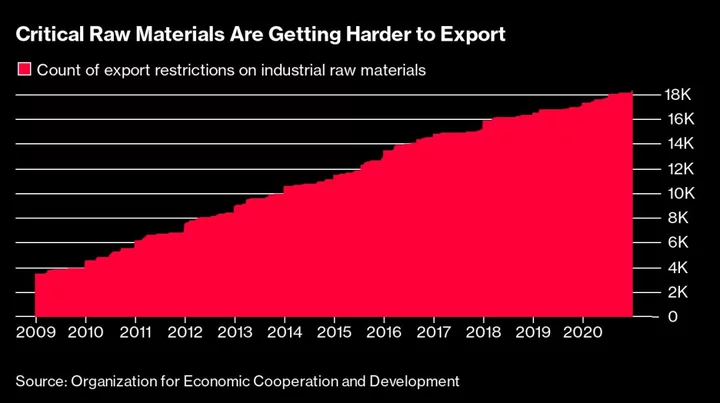
China Takes the Trade Fight to Europe, Targeting the Green Transition
China’s decision to restrict critical mineral exports will hit critical sectors in the European Union’s effort to decarbonize
2023-07-04 11:19
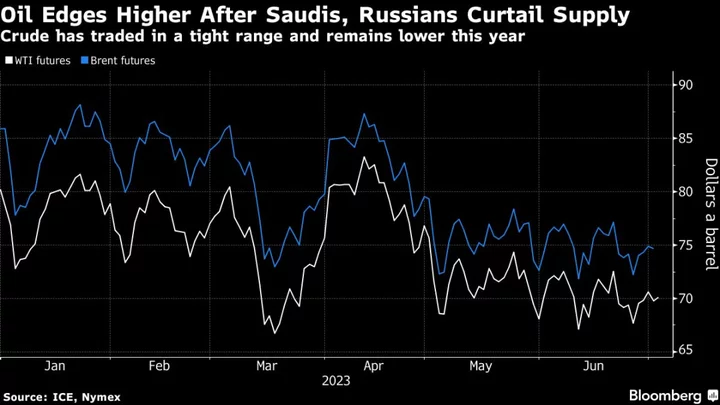
Oil Edges Higher After Saudi Arabia and Russia Curb Supplies
Oil rose modestly as traders assessed the latest salvo from OPEC+ kingpins Saudi Arabia and Russia to prop
2023-07-04 08:24

Rivian to Expand Amazon Electric Van Deliveries to EU in Germany
Rivian Automotive Inc. will expand deliveries of a battery-electric van it makes for Amazon.Com Inc. to Europe. It
2023-07-04 06:29

Amazon rolls out first European Rivian vans in Germany
By Nick Carey E-commerce giant Amazon will deploy its first European vans from U.S. electric vehicle (EV) maker
2023-07-04 06:17
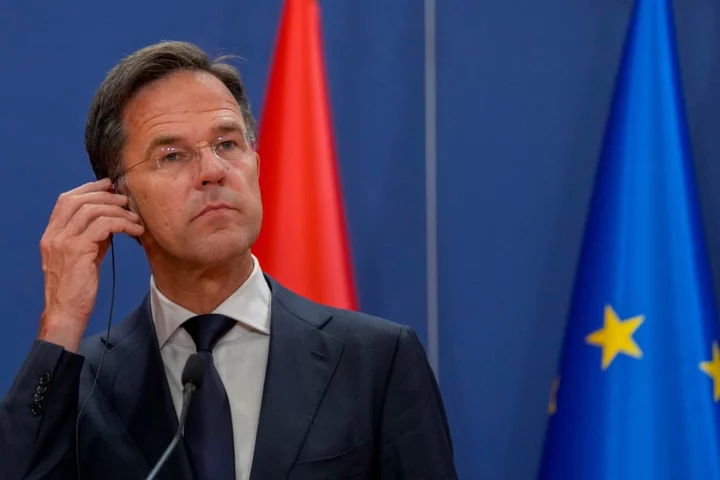
Dutch and Luxembourg PMs urge Serbia and Kosovo to defuse tensions under shadow of war in Ukraine
The prime ministers of the Netherlands and Luxembourg on Monday urged Serbia and Kosovo to act to defuse recent tensions that have threatened to push the Balkan region into instability as Europe faces Russia's aggression in Ukraine. Dutch PM Mark Rutte and Xavier Bettel, the Luxembourg PM, spoke after meeting Serbia's President Aleksandar Vucic in Belgrade. Rutte and Bettel travel to Kosovo on Tuesday for meetings with top officials there. “We cannot, both of us, emphasize enough how important it is that both Serbia and Kosovo take steps toward de-escalation and ultimately normalization of their relations through the EU-led dialogue,” said Rutte. “This is crucial for the two countries themselves, first and foremost, but also for the entire region and Europe as a whole,” he added. “With a war raging between Russia and Ukraine on our continent, it's more important than ever that we act together.” Serbia and its former province Kosovo have been at odds for decades, with Belgrade refusing to recognize Kosovo’s 2008 declaration of independence. Western efforts to resolve the crisis have increased recently, to avert possible instability in the Balkans as war ravages Ukraine. Tensions between the two countries flared anew in May after Kosovo police seized local municipal buildings in Serb-majority northern Kosovo to install ethnic Albanian mayors who were elected in an April election that Serbs overwhelmingly boycotted. Violent clashes injured 30 international peacekeepers and more than 50 ethnic Serbs, stirring fears of a renewal of the 1998-99 conflict that left more than 10,000 people dead, mostly Kosovar Albanians. The U.S and the EU have pressed Serbia and Kosovo to take steps to lower tensions. Normalization of relations is the key condition for the two countries to move forward in their efforts to join the EU. Bettel, too, called on the two sides to act. “Words are good, actions are better,” he said. “And we need to advance on these topics and to show also that there is a wish of de-escalation.” Vucic expressed hope that the two prime ministers' visit to Serbia and Kosovo would help. “I promised that Serbia will do all it can to preserve peace and stability,” he said. Washington and most EU nations have recognized Kosovo’s independence, while Russia and China have backed Serbia’s claim on the territory. The 1998-99 war erupted when separatist ethnic Albanians rebelled against Serbia's rule and Belgrade responded with a brutal crackdown. NATO bombing in 1999 forced Serbia to relinquish control but Belgrade has maintained Kosovo remains part of the country. Read More Ukraine war’s heaviest fight rages in east - follow live Charity boss speaks out over ‘traumatic’ encounter with royal aide Opponents of Serbia's populist leader block main highway to keep up pressure after weeks of protests Kosovo's prime minister offers to hold new elections in tense Serb-majority municipalities Novak Djokovic’s bid for Wimbledon title No. 8 and Grand Slam trophy No. 24 starts next week
2023-07-04 04:47
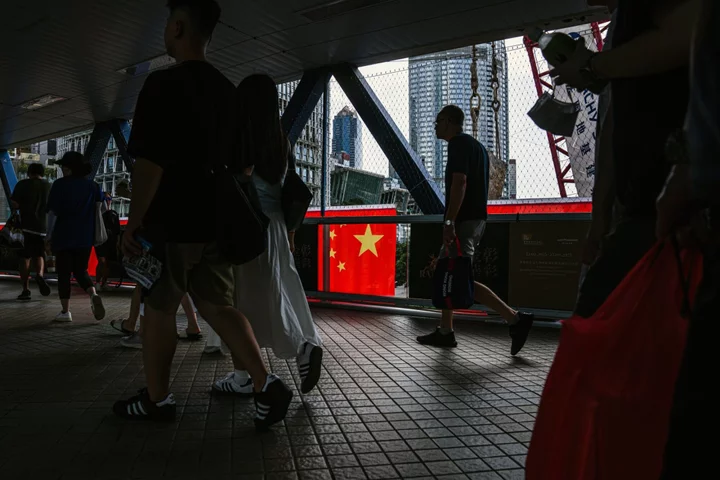
HK Police Put HK$1M Bounties on 8 Wanted Democracy Activists
Hong Kong police are offering HK$1,000,000 ($127,650) rewards for information leading to the arrest of eight pro-democracy activists
2023-07-04 02:54
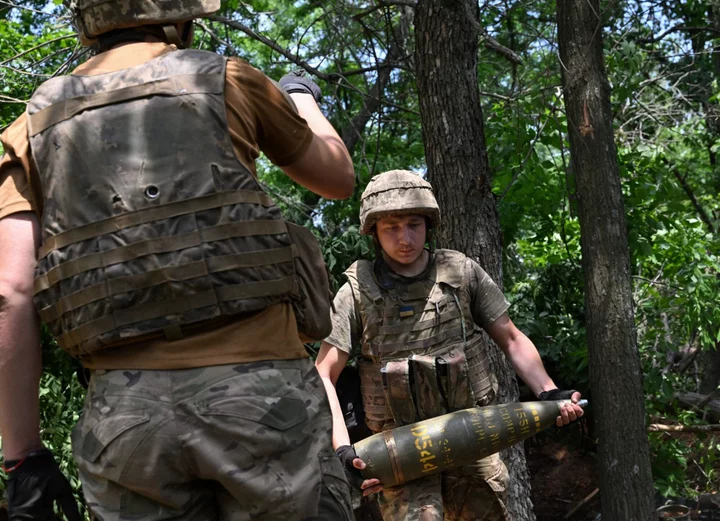
Ukraine Recap: Russian Defense Chief Plays Down Impact of Mutiny
Russian Defense Minister Sergei Shoigu said last month’s attempted mutiny by Wagner mercenaries failed because the country’s armed
2023-07-04 02:24
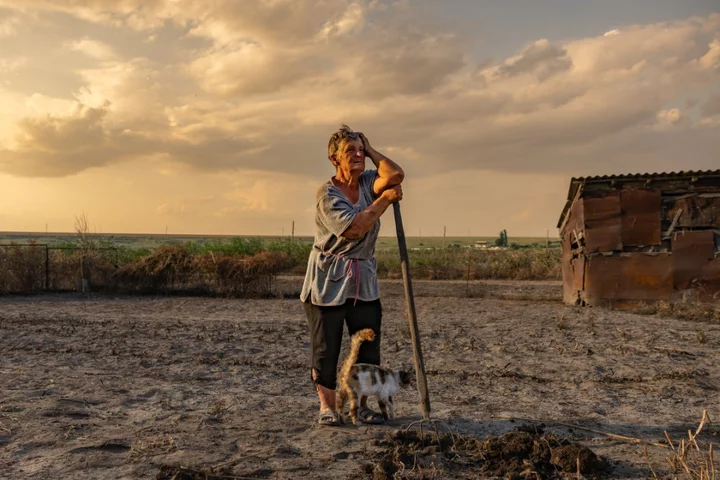
After the flood: The nightmare is just beginning for those left to rebuild after the Ukraine dam explosion
In a mud-soaked nightdress, the Ukrainian grandmother claws at the fetid water that has swallowed the steps down to her home in Kherson city. Frail and in shock, Antonia Shevchenko, 84 appears unaware of the futility of her attempts to try to drain the swamp drowning her house. Her daughter Svetlana, 64, marooned by the sweltering mud, tries to coax her to stop and calm down. Shelling roars in the background. It is the first time the pair have been back since they evacuated after the Nova Kakhokva dam blew up this month, unleashing the contents of one Europe’s largest reservoirs over southern Ukraine. The explosion - which Ukraine blames on Russia - sparked the worst ecological disaster on the continent in recent history and will likely impact global food security, according to the United Nations. In Kherson, the capital of the region, it killed dozens of people, submerged whole towns, drowned all the wildlife and turned this street into a canal. “We didn't even have time to get her clothes, we had to carry her in the slippers and nightie she is still wearing now,” says Svetlana in tears, as her confused mother repeats “It’s all just mud,” in the background. “It’s impossible to fix this. I feel nothing now. Everything is just empty inside. Now it’s all gone, we have nothing left," Svetlana adds. A few streets away Oksana Kuzminko, 70, who was also returning for the first time, picks her way through the devastation. “Welcome to zombie land,” she adds with a despairing shrug. Until recently the only way to navigate these streets was to steer a boat between the tops of the roofs of the submerged houses. Now the waters have receded, the terrifying scale of the damage and the work still to be done has been revealed. Sewage, mud, rubbish, dead animals, bits of masonry, and potentially land mines swirl together in the backyards of the partially collapsed houses. The area is still being pounded by Russian forces, stationed on the other side of the swollen banks of the Dnipro river. Anna Gatchecnko, 73, another elderly resident of this district, says the combination of flood waters and the war is “your worst nightmare”. “We survived the Russian occupation, the shelling and now this happened,” she says, wearing plastic bags she has tied to her feet in the toxic slush. “They took everything. My house, my belongings were the last things in this world that I had." The Kakhovka dam - essential for fresh water and irrigation in southern Ukraine - is located in a part of the Kherson region that Moscow illegally annexed in September and has occupied for the past year. The damage is so severe Ukraine has accused Russia of “ecocide” – believing Moscow’s forces blew it up in an attempt to prevent Kyiv’s troops from advancing in the south as they launched a counteroffensive. Moscow has vehemently denied the accusations and blamed Kyiv. Experts say the dam was so robustly built only an internal explosion could have caused such a catastrophic breach. The tearing floods have wiped out hundreds of towns and villages according to the United Nations, which has warned nearly a quarter of a million people have been left in need of drinking water. Downstream of the dam - towns and villages have morphed into polluted swamps where cholera has been detected. Upstream, the reservoir which once sustained swathes of agricultural land, has turned into a salty desert. Residents in those areas queue to get water from fire trucks under shelling. And the repercussions will be felt well beyond Ukraine’s borders, even potentially sparking global hunger. Ukraine - a major exporter of grains, oils and vegetables - was already struggling to export its harvest because of war. The ravages of flooding in one of the world’s most important breadbaskets will almost inevitably lead to lower grain exports, higher food prices around the world, and less to eat for millions in need. “The truth is this is only the beginning of seeing the consequences of this act,” Martin Griffiths, a United Nations aid official warned recently. It also raised fears about the stability Zaporizhzhia nuclear power plant, Europe’s largest, which relied on the waters of the now-dry Kakhovka reservoir to function. Rafael Grossi, head of the UN’s Atomic agency, which has unsuccessfully attempted to build a safety zone around the facility, was so concerned he travelled to the Russian-occupied plant. There he admitted it was "grappling with ... water-related challenges”. In Zaporzhizhia’s regional capital, Taras Tyshchenko, head of the Ministry of Health's Centre for Prevention and Disease Control, said if the Russians were capable of unleashing the waters over Kherson, they would have no qualms in taking out the nuclear power. After the dam's explosion, his health facility tests the air and waters across the region multiple times a day for radiation and contamination. So far they have detected cholera and remain on high alert for radiation. They have been through three rounds of training in the event there is a disaster at the nuclear power plant and have distributed potassium iodide tablets to those living within the danger zone. The damage from the destroyed dam is unfathomable, he says in front of the city’s main dock which is now dried out. The sweeping concrete jetty, which once hosted commercial water traffic, stoops forlornly over muddy puddles where his teams take water samples. “It could take well over a decade to fix the dam, refill the reservoirs and restore this region to normal," he adds grimly. "And that work can only really start after victory." In the interim cities, towns and villages along the Kakhovka reservoir will morph into wastelands if no solution is found. Deep fissures crisscross the cracked riverbeds where dead fish and molluscs slowly crisp in the sun. In one village, a forlorn fisherman drives a scooter across the desert scape in search of a pool of water. “Once the dam exploded we tried to build our own mini dams to try to retain some water, “ explains Vitaly Marozov, 29, who works at a 400-hectare farm producing vegetables and fruit just outside of the city of southern city Nikopol. He plays us a video of local volunteers building a makeshift barrier out of sacks and soil. “Now we are trying to dig wells but the water is salty," he adds. This is already destroying crops. Standing by a destroyed field of cabbages, dusted white with salt, he says they will be lucky if they can salvage a fifth of their total yearly yield. The damage he believes will cost their farm 22 million hryvnia, or around £500,000, and it will only get worse as the season progresses. “We are just one farm, this is the case all around this area. This will impact global food security unless someone does something drastic,” he continues. Back in the water-logged regions, volunteers deliver aid by boats to the communities now cut off from help. Others bring pumps to try to drain the pools of stagnant water from the worst-hit areas. But all it does is expose the irreparable damage done to the entire southern sweep of Ukraine. We find Olha Mosyk, 70, who was forced to swim to safety with a litter of newborn kittens, islanded by destruction in her home in the Mykolaiv region. Sodden muddy piles of dirt mark the remains of the walls of her house. “You need steel teeth to break Ukrainians. That won’t work on me,” she says, pulling up the remains of rotten potatoes from her destroyed field which is the same tyranny of blackened mud. “All we can do is try to pull ourselves together,” she adds with a pause. Back in Kherson city, Svetlana tries to comfort her mother Antonia who is on the cusp of a panic attack. “How do I feel? Crying all the time. My whole body is shaking,” the 84-year-old says faintly, her red floral nightie a flash of colour in the grey water. “It’s all flooded. My whole life is underwater.” Read More Zelensky accuses Russia of plotting ‘radiation leak’ attack at Zaporizhzhia nuclear plant Ukraine's president tells other countries to act before Russia attacks nuclear plant Ukrainian soldiers rescue Russian troops left to drown after Kakhovka dam destruction Russia-Ukraine war live: Moscow ‘arrests General Armageddon’ over Wagner rebellion Recapping the revolt in Russia, through the words of 4 presidents and a mutinous warlord
2023-07-03 23:22
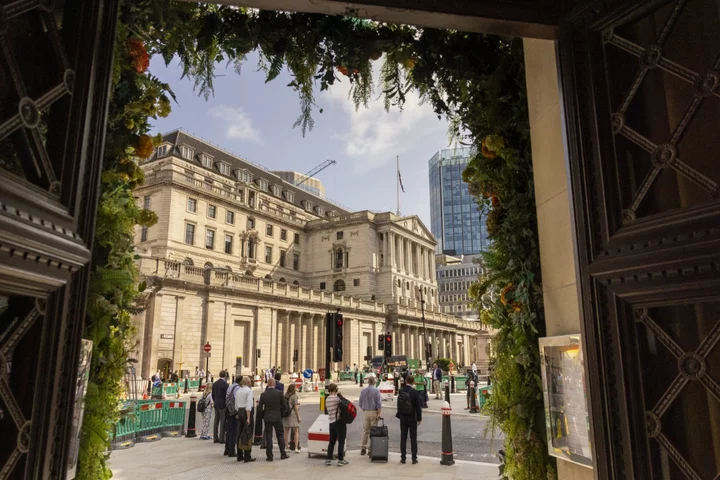
BOE Newcomer Greene Warns UK Rates May Be Higher Permanently
The Bank of England’s newest policy maker Megan Greene warned that interest rates may settle at higher levels
2023-07-03 22:27
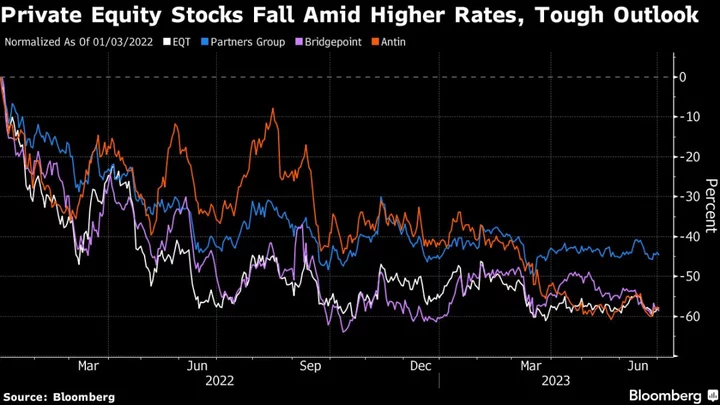
Avoid Private Equity Stocks as Rates Rise, JPMorgan Analysts Say
Europe’s private equity firms are a bad bet for stock investors as the industry grapples with depressed dealmaking
2023-07-03 21:59
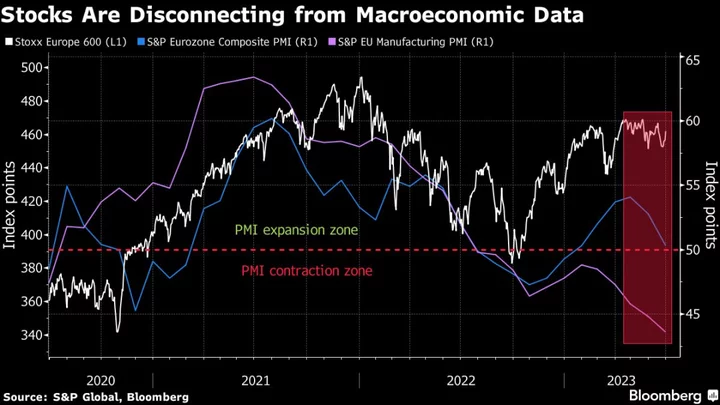
European Stocks Muted After First-Half Gains; Energy Shares Rise
European stocks were muted on Monday following gains in the first half of the year as cyclical sectors
2023-07-03 21:28
